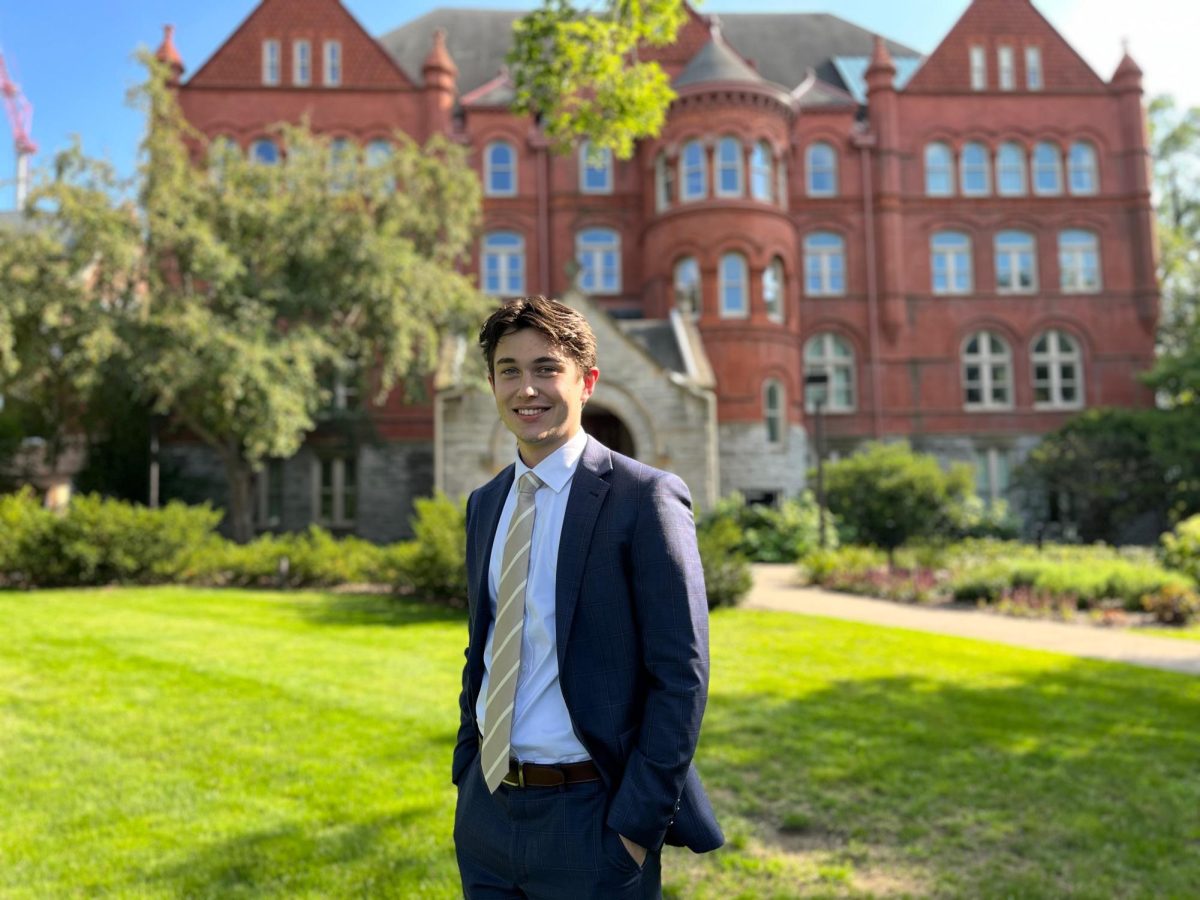Macalester announced on Thursday that they have signed a 25-year deal with SunEdison, a global solar energy company, to begin participating in a Community Solar Garden (CSG) program. The agreement will allow Macalester to offset 100 percent of its energy usage through solar energy credits.
A solar garden is a solar electric array with multiple subscribers connected to the utility grid. The subscribers may purchase a portion of the power produced by the array and receive a credit on their electric bill.
The Macalester administration was notified of this opportunity by both current students and alumni. Michael Noble, a Mac alum who works with FreshEnergy, an environmental consulting group that has been lobbying for clean energy legislature, approached the administration to inform and educate them about the new policy in place.
The deal came about when current Macalester students and alumni came forward to the administration after the passage of a piece of renewable energy legislation titled “The Minnesota Solar Energy Jobs Act in 2013.”
The legislation requires that state utilities must generate 1.5 percent of their energy from solar power. In Minnesota, this applies to Xcel, Macalester’s electricity provider.
Many power companies are meeting this and similar requirements in other states by issuing permits to companies that can build CSGs. The CSGs produce energy that goes directly to the grid. In this instance, energy produced by SunEdison goes into Xcel’s grid. One of the advantages of a Community Solar Garden is that Macalester can benefit from solar without having to provide the land or maintain the array. Macalester does not own the solar array and bears no risk; they simply have a right to the credits generated by the array’s electricity by paying a monthly subscription fee.
Macalester has signed on as a subscriber to SunEdison’s CSG, along with other notable area companies, including Minneapolis-based firm EcoLab.
“In some ways, we’re kind of an ideal partner for [SunEdison],” Vice President of Administration and Finances David Wheaton said. “They want to find someone who will use a predictable amount of power, and someone who will be staying in Minnesota and not relocating to any other state. I think that we fit nicely into this.”
Macalester receives additional financial incentive from Xcel by giving them the rights to the certifications associated with the new solar project.
“For each kilowatt hour of carbon-free electricity produced, there’s a Renewable Energy Certificate (REC) attached to it so that you can certify that it is indeed carbon neutral,” Jack McCarthy ’18 explained. He helped to spearhead the project as a student employee of the Sustainability Office and as a member of the student organization Macalester Conservation and Renewable Energy Society (MacCARES).
Because Xcel needs RECs to show to the legislature to ensure that they are meeting their agreements required by the solar bill that was passed, they pay a premium for the RECs produced by Macalester’s CSG subscription.
Because Macalester does not receive RECs as part of the subscription to the CSG, this agreement does not reduce Macalester’s reported carbon emissions. However, by entering into this CSG subscription, Macalester enables the creation of renewable energy generating capacity in Minnesota.
Although the electricity produced by the CSG does not go directly to Macalester or reduce its carbon emissions, it does reduce the carbon emissions of the grid as a whole, indirectly reducing Macalester’s carbon footprint.
“Here is a way for us to do something positive,” Wheaton said. “We can take a step that is really visible and does something helpful with respect to climate change.”
The action first began at Macalester when a different solar energy company approached Macalester through the Sustainability Office about subscribing to one of its CSGs. McCarthy then reached out to two other solar companies, including SunEdison. After several meetings with the companies and members of the administration, all three companies submitted their proposals for a CSG to the school, vying for the opportunity to work with Macalester. In the mean time, McCarthy spent time talking with administrators and explaining the concept.
“We got these three proposals, and then we had to go about convincing the administration that this was legitimate, reliable, and that we could save money as an institution,” McCarthy explained.
“We [Other members of MacCares and I] wrote an official letter to the administration, describing the situation and what we were doing. We looked at how this would benefit the school and how this would benefit the Twin Cities, and that was really fun. I feel like it wrote itself,” McCarthy said.
Representatives of the companies also met with Wheaton and Nathan Lief, Macalester’s Director of Facilities to discuss technical details and the specific ways in which the project would work at Macalester.
Just before spring break, a final and decisive meeting helped solidify Macalester’s partnership with SunEdison.
“We looked at the three proposals we’d gotten and compared them by basic factors; where they’re located, where they operate, how big they are, how much they’re going to do in this program this year, and how much [of their energy produced] we’re eligible for,” McCarthy explained. “It became very clear that SunEdison was the best for us.”
One aspect of SunEdison’s proposal that made it particularly enticing for Macalester was its offer of charging Macalester a flat monthly rate.
Because Macalester would be paying a fixed rate to SunEdison for the duration of the contract while simultaneously receiving credits from Xcel, the deal would result in a net reduction of operating costs for the school. Because the value of the credits received off of Macalester’s power bill is greater than the amount paid to SunEdison, the results is net savings. The credit value is tied to the market rate of electricity, so that as Xcel raises rates, Macalester’s savings increase. In the first year alone, Macalester is predicted to save around 20 percent off of its energy bill.
“This could really be valuable 15 or 20 years down the road,” Wheaton explained. “We think it could be of some real financial benefit for us.”
“We’re excited about this,” Wheaton said. “We think that this fits right in with how Macalester thinks about itself and what we value, and here’s a nice way for us to connect to this kind of activity in Minnesota and to get some benefit ourselves.”






Hannah Hardacre • Sep 11, 2019 at 11:15 pm
I have read several good stuff here. Certainly price bookmarking for revisiting. I wonder how much effort you place to make the sort of excellent informative site.
Liam Dowd • Sep 10, 2019 at 4:48 pm
This is really interesting, You’re an excessively professional blogger. I have joined your rss feed and sit up for in quest of more of your magnificent post. Also, I’ve shared your website in my social networks!
David Bailey • Sep 8, 2019 at 5:27 am
This web site offers pleasant quality YouTube videos; I always get the dance competition show video tutorials from this web page.